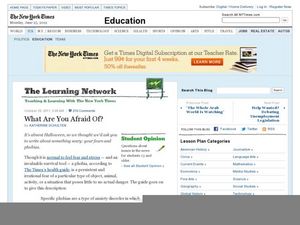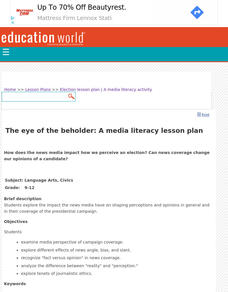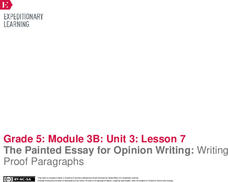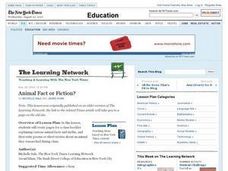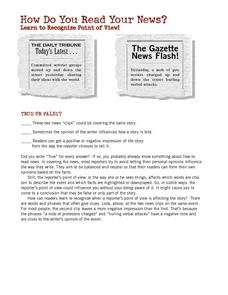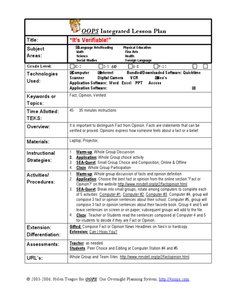Curated OER
Fact and Opinion
In this writing activity, students identify and describe the difference between a fact and an opinion. They place the cut-up words from the house ad in the correct column to indicate if they are fact or opinion.
Pennsylvania Department of Education
Analyzing Key Ideas and Details in Nonfiction
Students explore nonfiction texts. In this language arts lesson, students read a nonfiction text and make predictions. Students identify facts and opinions in the text and draw conclusions as they read.
Curated OER
Lead Critical Reading
Students read opposing views on the lead contamination issue, identify the facts and opinions in each article, and infer the opinion of the author. They create an essay expressing their opinion on the issue complete with citations.
Curated OER
Food Myths Critical Thinking and Reading
Students read a series of statements made by students about the hazards and benefits of various foods. They distinguish the "facts: from "opinions" in the dialogue, summarize the facts in a short paragraph, and write an essay...
Curated OER
Water and Sewage Critical reading
Students read three articles with different points of view on the water and sanitation issues in the Florida Keys. They identify the facts and opinions in each article and write a summary. In addition, they write an essay expressing...
Curated OER
Student Opinion: What Are You Afraid Of?
A great resource for informational texts as well as writing topics, the New York Times website provides writing prompts about various news articles through The Learning Network. This particular worksheet provides a very short reading...
Curated OER
The Eye of the Beholder: A Media Literacy Activity
High schoolers explore the impact the news media have on shaping perceptions and opinions in general and in their coverage of the presidential campaign.
Curated OER
Fact and Opinion
In this fact/opinion worksheet, students write either fact or opinion after a set of 10 statements, then record their score out of 10.
Curated OER
Groundhog Day
Don't miss this resource when Groundhog Day arrives! Youngsters read the book Groundhog Day by Gail Gibbons and practice reading comprehension skills, and then choose from a series of engaging, cross-curricular activities to help...
EngageNY
The Painted Essay for Opinion Writing: Writing Proof Paragraphs
It's time to proof read! Pupils read and analyze proof paragraphs from a model essay. They then practice writing their own proof paragraphs to express an opinion about offshore oil drilling.
EngageNY
Author’s Read: Final Performance Task
Scholars submit their final performance task, a letter to a publisher about an athlete's legacy. As a culminating activity, they share their work with classmates in small groups.
Curated OER
Animal Fact or Fiction?
Read and discuss the article "Welcome to Cicadaville (Enter at Your Own Risk)" to gain a better understanding around the confusion regarding cicadas and locust swarms. In groups your young analysts research statements about animals to...
Roy Rosenzweig Center for History and New Media
Analyzing Political Campaign Commercials
Imagine a lesson that models for learners how to separate facts from opinions. How to detect bias. How to evaluate a source of information. How to identify propaganda. Although designed for middle schoolers, the activities in this packet...
Curated OER
Bias
Learners apply techniques of distinguishing between fact and opinion. Students identify words associated with persuasion and argument. Learners read and categorizer a variety of newspapers and articles. Students identfy bias in a...
Curated OER
Fact
Students read about polar bears and discuss and identify the facts they learn about them. In this facts lesson plan, students explain why their facts are not opinions.
Curated OER
Electrifying Franklin
Fourth graders research and present information about Benjamin Franklin's life and accomplishments. For this lesson on Benjamin Franklin, 4th graders review idioms and sayings written by Franklin then compare and contrast his various...
Curated OER
Identifying Facts
Students evaluate what a fact is and what the characteristics of a fact are. In this fact and opinion lesson, students read through chapters in their books and point out facts that they find that cannot be disputed.
Curated OER
Thinking Out Loud
Learners share opinions about whether a series of statements from the internet constitute facts or opinions. They read and analyze blogs published in on the web in order to understand the use of fact, opinion, and tone of voice when...
Curated OER
Opinion
An important concept for youngsters to learn is that there is a difference between facts and opinions. Use Kirsten Hall's Animal Touch to introduce the idea that an opinion is how one feels or thinks about something and that others are...
TV411
How Do You Read Your News?
Words carry baggage. Class members are asked to consider the weight of words in an exercise that contrasts the word choices in two versions of the same event. Consider following the exercise with an activity in which pairs craft positive...
Achievement Strategies
CCSS Unpacked Learning Targets for Reading and Writing History/Social Studies
How do all the lessons and activities you have planned for your class align to Common Core State Standards? This can feel like a very daunting question. Help ease the process by referencing a template that not only lists and organizes...
Florida Center for Reading Research
Comprehension: Text Analysis, Fiction and Nonfiction Find
Scholars analyze fiction and nonfiction text and fill in a worksheet detailing the text's title, genre, and reason for its classification.
Scholastic
Drones Take Off
Ever wonder what drones are doing high above us in the sky? This article gives your class an insight to what those robots in the sky are doing. After reading an article on drone technology, pupils are prompted to respond to a variety of...
Curated OER
"It's Verifiable!"
Students examine the differences between fact and opinion. They define fact and opinion, evaluate their favorite fact or opinion on a website, and in small groups write sentences using facts and opinions about school and their favorite...







